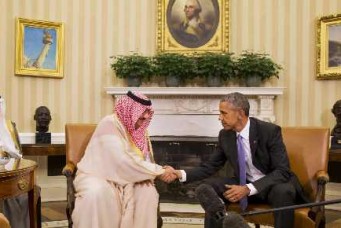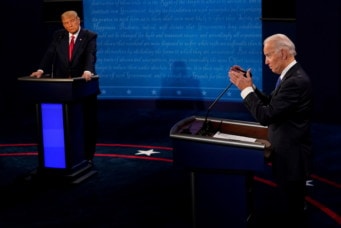What Should Arabs Expect from a Biden Win?
Suspended between feelings of hope and anxiety, the region will watch on as a Biden administration either continues or breaks with past policies and alliances

News of Joe Biden’s victory in U.S. elections is aired on a digital screen in Dubai Stock Exchange in Dubai, United Arab Emirates, Nov. 8, 2020. Reuters/Abdel Hadi Ramahi
The tumultuous U.S. presidential election has left Arab states questioning their fate and the role they will be allowed to play in their region. One thing is for certain, however–U.S. relations with Iran will be at the heart of the region’s geopolitics; at least that’s how Raghida Dergham, a prominent Lebanese–American journalist and founder of the Beirut Institute, puts it.
“There is no one Arab perspective,” Dergham says. She suggests that, generally speaking, the Arab perspective will likely fall within one of two categories: those who feel immense relief and those who feel immense anxiety with regards to the changes president-elect Biden will bring to U.S.–Middle East relations.
Dergham’s lucid dissection of Middle Eastern perspectives on the 2020 U.S. elections came as part of a conversation series organized by the Harvard Kennedy School as part of its fall 2020 Middle East Initiative (MEI). The series, titled “USA 2020: The View from the Arab World,” is co-hosted by Tarek Masoud and Karim Haggag and attempts to tackle the question of how American politics would play out in the Middle East.
Many believe that Trump’s presidency, while tedious and exhausting, provided a significant platform for the consolidation of America’s relationship with the region. This also seems to be the case because Trump’s restorative connection-making took place against a backdrop of Middle Eastern animosity toward the Obama administration.
However, a Biden presidency does not necessarily mean the demise of Middle Eastern geopolitics entirely. There is optimism among many that relative regret over the Obama administration in hindsight may bring about better regional alliances. Dergham mentioned Syria, which is pleased with the change in American administration, as the exception. So too Iran, a state she feels will be empowered to enhance its influence over the region without being hindered by the Trump administration. “Iran will feel strengthened again, and powerful again to the extent that it will implement its projects in Syria, in Lebanon, in Iraq and in Yemen. And for many Arabs, this is an encroachment on Arab geography that they do not welcome,” she said. Egypt is cited as being one of the possible losers of a Biden presidency, she added. Trump had bolstered his relationship with Egyptian President Abdel Fattah El-Sisi, a relationship which could soon wither away. Dergham also raised the question of Turkey and its support of the expansion of the activities of the Muslim Brotherhood in the region.
Masoud, professor of Public Policy and the Sultan Qaboos bin Said of Oman professor of International Relations, proverbially tied a ribbon around Dergham’s argument by suggesting that she believes “the only Arabs that will be happy about a Biden victory are those who are either in cahoots with Iran or in cahoots with the Muslim Brotherhood”.
Dergham added that there are those who will not be anxious about a Biden presidency because they would feel as though falling into the proverbial arms of Iran will not prove to be an easy feat. A portion of policymakers feel as though the Biden administration will need to dissect the policy system set up by the Trump administration and “build on it rather than throw it in the sea”. Dergham warns that members of the Biden team may be quick to revive old Obama–Biden policies, specifically mentioning the likely drive toward the resurrection of the Joint Comprehensive Plan of Action (JCPOA), otherwise known as the Iran Nuclear Deal, a deal Trump fervently resented and eventually withdrew from in May of 2018. However, a revival of the deal will not be possible without a fair number of obstacles, “above all because of the missiles” Dergham added. The deal itself has been a point of contention since its conception by the Obama administration. Dergham suggested that the JCPOA enabled the Obama administration to turn a blind eye to the atrocities taking place in Syria, which is possibly the administration’s biggest regret.
A challenge we must not forget is that of democratization, Dergham added. “Democracy is not an easy word, not in this part of the world or anywhere else,” she stated, because there is no trust in the American drive for democracy in the region anymore. This distrust was bred by the Bush administration’s invasion and occupation of Iraq in 2003 and has continued to tarnish the relationship between the United States and the Middle East ever since.
The diverse range of perspectives with regards to the change in the American presidency will yield different policy implications with regards to the various players in the region. The overwhelming idea seemed to be that the sanctions the Trump administration had imposed on individuals, parties, states, and militias in the region displayed a commitment to the fortification of alliances that was somewhat absent under Obama.
Considering Arab Roles in The Region
But will Arab countries have a role to play in manufacturing policies that guarantee their decision-making power in the future? In the past, Middle Eastern countries have been notoriously excluded from negotiations that they, more often than not, eventually bear the consequences of. But what agency have Arabs given themselves before that?
“The criticism from the region toward U.S. policies under Obama led to this estrangement between the administration and its partners in the region. But the counter criticism from the U.S. side was that the Arab World has no solutions to these problems. What is the Arab solution for Iran’s nuclear program? What is the Arab solution to the Syrian civil war? What is the Arab solution for the proliferation of Iranian forces?” asked Haggag, visiting fellow at the Middle East initiative and co-managing editor of the Cairo Review of Global Affairs.
In response, Dergham explained that Arabs have been purposefully excluded “in a very predetermined way” particularly with regards to U.S.–Iran negotiations. Overwhelmingly this seems to be the case because Arabs do not have the necessary channels through which to communicate their position. Most pertinent is the case of the JCPOA, where discussions were held between the five permanent members of the Security Council, Germany, and Iran. No Arab states were given the opportunity to participate in the negotiations, but Dergham insisted that they should have been given the platform regardless of the fact that, perhaps, they themselves did not “push enough” for it.
Dergham stressed the impotence of regional administrative structures as one of the primary reasons for the Arab inability to participate. The Arab League has proven ineffective in recent months, particularly on the issue of Arab states breaking ranks and continuing to normalize relations with Israel. Likewise, the Gulf Cooperation Council (GCC), ridden with internal conflict due to the recent rift between Qatar on one side and Saudi Arabia and the UAE on the other, has been unable to take decisive action with regards to Arab–Israeli relations. Some policymakers suggest that GCC countries have strengthened their relationship with Israel in an attempt to consolidate power and take a stand against Iran and Turkey. There is a general understanding, Dergham posited, that Arab states are not in control of their own security structures. Attempts at developing such a structure have been made in recent years, primarily by Iran, as a way to expand its hegemony over the region. These attempts were inevitably shot down leaving Arab states in a state of limbo.
Uncertainty About the Future?
Dergham holds that Saudi Arabia will evolve into a more important American ally. Unites States–Saudi relations have thrived to a great degree under the Trump administration’s supervision, and perhaps they will stay that way. Saudi Arabia has been encouraged by Trump to normalize relations with Israel, a move the United States would support.
But normalization of ties with Israel is not a decision reached by Arab consensus. Dergham had previously said that she did not believe that the Abraham Accords—the agreement between the UAE and the United States this year to normalize relations with Israel—were unanimously agreed upon by all Arab states. She adds that there continues to be significant opposition to the idea of normalizing relations with Israel. The role the United States, in her view, should be to urge Israel to halt its annexation plans and push for a two-state solution that includes the State of Palestine.
As for the situation in Syria, Dergham said that the continuing hold of the Damascus government cannot be viewed as a “clear win” for Russia. She believes Biden will uphold the terms of the 2020 Caesar Syria Civilian Protection Act, which imposes sanctions on foreign actors conducting transactions with the Syrian government and its allies, but not without some level of guilt with regards to the policies he had initially enacted during his vice-presidency under Obama. Nevertheless, if the United States will be actively involved in the conflict resolution process, they should do so while considering the relative strengths of Turkey, Iran, and Russia but while also remembering not to overstate Syrian President Bashar Al-Assad’s strength.
In responding to other crises in the region, such as the Beirut explosion, the U.S. response in contrast to France’s was minimal. Dergham suggested that France has not been acting alone or in a vacuum and that Macron’s efforts have been aided and abetted by the United States in the form of individual sanctions which Dergham deems quite impactful. She cited the effectiveness of these sanctions on some Lebanese officials, singling out Lebanese Speaker of the Parliament Nabih Berri, in positively influencing top-level decision-making as well as helping fight the socio-political corruption that has crippled the country for decades.
Above all, Dergham is somewhat uncertain about the nature of U.S.–Middle Eastern relations in the next four years. The region could face a regretful Biden administration keen on rekindling important alliances, or a far more malicious presidency that could unravel regional connections curated by Trump.
Mahmoud El Shabba is a reporter-researcher at the Cairo Review of Global Affairs.
Read More



